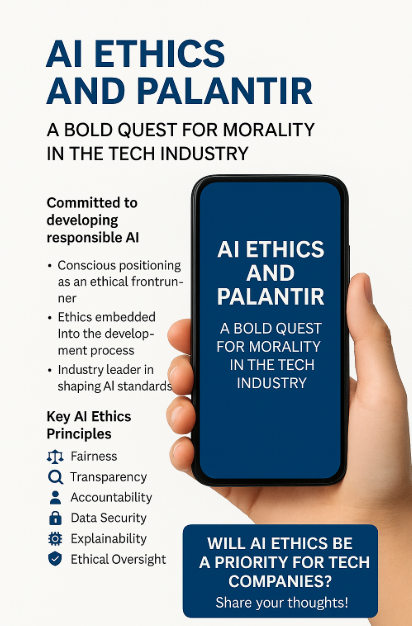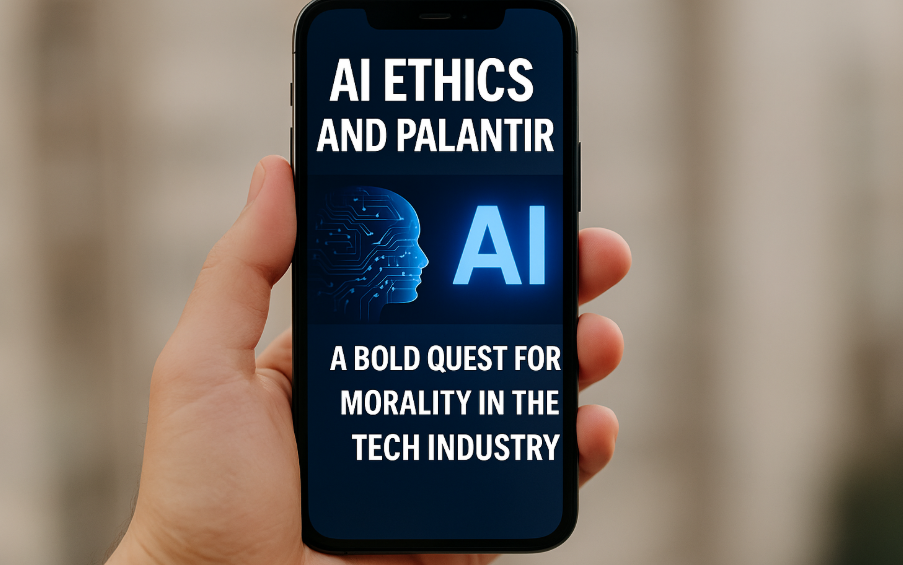As artificial intelligence continues to evolve, concerns around ethics and responsible AI development have moved from academic discussions to front-page headlines. The use of AI across sectors from healthcare and finance to national security raises complex ethical questions about fairness, accountability, bias, and data protection.
One company pushing to address these concerns is Palantir Technologies. Widely known for its data analytics platforms and government partnerships, Palantir is now gaining recognition for its vocal stance on AI ethics. But how is it implementing ethical principles in practice and what could this mean for the future of technology?
The Ethical Awakening in Silicon Valley
Silicon Valley has long been associated with innovation and disruption. However, this rapid advancement has often come at the cost of ethical foresight. Tech companies have been criticized for developing systems without considering consequences such as algorithmic bias, surveillance overreach, and the misuse of personal data.
Palantir is attempting to shift this narrative.
What Makes Palantir’s Ethical AI Push Stand Out?
-
Conscious Ethical Positioning:
Unlike some competitors, Palantir has positioned itself at the forefront of the ethical AI conversation. With growing scrutiny around its contracts and AI-powered platforms, the company has committed to making its systems transparent and accountable. -
Ethics-by-Design Philosophy:
Palantir engineers AI with ethical safeguards from the start, not as an afterthought. It promotes incorporating ethical checkpoints directly into algorithmic development and decision-making pipelines. -
Thought Leadership on Industry Standards:
As a leader in the space, Palantir’s push for ethical AI could set a precedent. Its internal policies, research collaborations, and transparency initiatives serve as models that other tech companies are beginning to follow.
Inside Palantir’s AI Ethics Framework
So, what are the actionable steps Palantir is taking to embed ethics into its AI systems?
1. Codified AI Principles
Palantir has publicly stated a set of core AI ethics principles. These revolve around fairness, transparency, and accountability. Developers are encouraged to review ethical risks throughout the development lifecycle, including bias detection and privacy compliance.
2. Partnerships with Ethics Researchers
The company works with third-party ethicists and university researchers to guide the development of their AI platforms. This external oversight helps mitigate internal blind spots and ensures that AI systems are evaluated from multiple perspectives.
3. Ethics Education and Internal Training
Palantir has developed internal training modules to educate engineers, data scientists, and leadership teams on AI risks and responsibilities. The goal: to build a culture of accountability within every tier of decision-making.

What Palantir’s Ethics Push Means for You
Whether you’re a tech user, investor, policymaker, or developer, Palantir’s AI ethics commitment could shape your experience in several ways:
-
Data Privacy Protections
Palantir emphasizes secure data handling and informed consent. As AI becomes embedded in more platforms, users can expect increased safeguards. -
Greater Transparency in Outcomes
Palantir aims to make AI decisions explainable. This means users—whether governments or end-consumers can better understand how outputs are derived, reducing the risk of blind trust in black-box algorithms. -
Influence on Broader Industry Standards
As a major AI player, Palantir’s practices may drive peer companies to adopt more transparent and accountable approaches, improving the ethical health of the entire ecosystem.
The Broader Implications for Tech and Society
Palantir’s ethical initiatives reflect a larger movement in the AI industry. With regulators eyeing stricter compliance laws and consumers demanding responsible tech, ethics will soon become a business imperative, not just a PR strategy.
Expect to see more companies integrating:
-
Bias audits before algorithm deployment
-
Human oversight in AI-powered decisions
-
Greater openness about data usage and model accuracy
Conclusion: Ethics as a Competitive Advantage
Palantir’s journey toward responsible AI is not just commendable it may become essential for future success in tech. By building ethical considerations into the foundation of its AI systems, Palantir is leading the charge in redefining what it means to innovate with integrity.
For users, this translates to safer, more transparent tools. For the industry, it’s a call to evolve beyond technical performance and prioritize human impact.
Final Call to Action:
As AI becomes more influential in our lives, should companies be legally required to follow ethical AI practices?
What role do you think companies like Palantir should play in shaping tech’s moral future?







